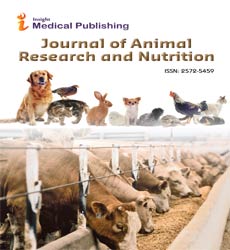Ruminant Nutrition through Strategic Supplementation
Ashley Jane*
Department of Animal Science, Kwame Nkrumah University of Science and Technology, Kumasi, Ghana
DOI10.36648/2572-5459.9.2.116
Ashley Jane*
Department of Animal Science, Kwame Nkrumah University of Science and Technology, Kumasi, Ghana
- *Corresponding Author:
- Ashley Jane
Department of Animal Science, Kwame Nkrumah University of Science and Technology, Kumasi,
Ghana,
E-mail: Jane_a@gmail.com
Received date: March 08, 2024, Manuscript No. IPJARN-24-19172; Editor assigned date: March 11, 2024, PreQC No. IPJARN-24-19172 (PQ); Reviewed date: March 25, 2024, QC No. IPJARN-24-19172; Revised date: April 01, 2024, Manuscript No. IPJARN-24-19172 (R); Published date: April 08, 2024, DOI: 10.36648/2572-5459.9.2.116
Citation: Jane A (2024) Ruminant Nutrition through Strategic Supplementation. J Anim Res Nutr Vol.9 No.2: 116.
Description
Ruminants, including cattle, sheep and goats, play a vital role in agriculture by converting fibrous plant materials into highquality protein for human consumption. Their unique digestive system, which includes a complex stomach with four compartments (the rumen, reticulum, omasum and abomasum), enables them to digest cellulose and hemicellulose through microbial fermentation. This process not only provides energy to the animals but also produces Volatile Fatty Acids (VFAs) and microbial protein, essential for their growth and production.
Effective ruminant nutrition is crucial for optimizing growth rates, milk production, reproductive performance and overall health. However, achieving balanced nutrition can be challenging due to the variability in forage quality, seasonal changes and the nutritional needs of different life stages or production goals. Supplementation strategies have been developed to address these challenges, enhancing the efficiency of nutrient use and improving animal performance. This communication focuses on two critical areas of ruminant supplementation, protein and energy.
Protein supplementation in ruminant diets
Protein is a fundamental component of ruminant diets, essential for growth, reproduction and lactation. However, forages often have varying protein content and may not always meet the nutritional requirements of ruminants, especially during certain life stages or under intensive production systems. Protein supplementation can find this gap, ensuring optimal animal performance. Protein supplements can be categorized into natural protein sources and Non-Protein Nitrogen (NPN) sources. Natural protein sources include oilseed meals (such as soybean meal, cottonseed meal and canola meal), legume forages and byproducts from food and feed industries. These sources provide high-quality protein with essential amino acids that are readily available for rumen microbes and the host animal. NPN sources, such as urea and ammonium salts, do not contain protein, but supply nitrogen, which rumen microbes can use to synthesize microbial protein. This microbial protein is then digested and absorbed in the small intestine, contributing to the animal's protein requirements.
Adequate protein intake is for muscle development and milk synthesis. Protein supplements can significantly enhance growth rates in young animals and boost milk yield and quality in lactating females. Protein deficiency can impair reproductive functions, leading to delayed puberty, poor estrus expression and reduced conception rates. Supplementing protein can help maintain optimal reproductive health. Rumen microbes require nitrogen to proliferate and function effectively. Protein supplements support microbial growth, improving fiber digestion and overall nutrient absorption.
Use of protein supplements
Effective protein supplementation involves not just providing the right quantity but also ensuring the quality and timing of the supplementation. It is important to provide a balance between Rumen-Degradable Protein (RDP) and Rumen-Undegradable Protein (RUP). RDP supports microbial activity, while RUP escapes rumen degradation and is directly absorbed in the intestine, providing amino acids to the animal. During periods when forage quality is low, such as in dry seasons or when feeding mature hay, protein supplementation becomes more critical. High-protein supplements can compensate for the low nitrogen content in forages.
Protein requirements vary with the animal’s age, physiological status and production goals. For instance, growing animals and lactating females have higher protein needs compared to mature, non-lactating animals. Energy is a source of ruminant productivity, influencing growth, milk production and overall metabolic functions. While forages provide the bulk of energy through carbohydrates, their energy density can sometimes be insufficient, especially during high-demand periods. Energy supplementation helps to meet these demands, ensuring sustained productivity.
Energy supplements can come from carbohydrates, fats and oils. Common carbohydrate sources include cereal grains (such as corn, barley and oats), by-products like molasses and beet pulp and high-energy forages like silage. Fats and oils, such as those derived from oilseeds and animal fats, offer a concentrated energy source with a high caloric value. Energy supplements can significantly enhance growth rates in young animals by providing the necessary calories for muscle development and overall body weight gain.
Lactating animals have high energy demands. Supplementing energy ensures that these animals have sufficient calories to support milk synthesis, leading to higher milk yield and better milk quality. Adequate energy intake is essential for maintaining body condition and reproductive health. Energy supplementation can prevent negative energy balance, which can delay estrus and reduce conception rates. It is essential to balance the intake of forages and energy supplements. Overreliance on energy supplements can reduce fiber intake and negatively affect rumen function. Therefore, energy supplements should complement, not replace, forage.
While fats provide a high energy density, their inclusion in the diet should be managed carefully. Excessive fat can interfere with fiber digestion and rumen microbial activity. Typically, fats should constitute no more than 6%-7% of the total diet dry matter. The timing and frequency of energy supplementation can impact its effectiveness. Frequent, small meals can improve nutrient utilization and stabilize rumen fermentation, enhancing overall productivity.
Protein and energy supplementation are critical components of effective ruminant nutrition, addressing the limitations of forage-based diets and supporting optimal animal performance. By strategically using supplements to balance nutrient intake, farmers can enhance growth, milk production and reproductive efficiency, ultimately improving the sustainability and profitability of ruminant production systems. Understanding the specific nutritional needs of ruminants at different life stages and production levels is essential for developing targeted supplementation strategies. Moreover, ongoing research and advancements in animal nutrition continue to provide new insights and tools for optimizing ruminant diets, ensuring that supplementation practices evolve with the changing demands of modern agriculture. By integrating these strategies, farmers can achieve better animal health and productivity, contributing to the overall efficiency and sustainability of the livestock industry.

Open Access Journals
- Aquaculture & Veterinary Science
- Chemistry & Chemical Sciences
- Clinical Sciences
- Engineering
- General Science
- Genetics & Molecular Biology
- Health Care & Nursing
- Immunology & Microbiology
- Materials Science
- Mathematics & Physics
- Medical Sciences
- Neurology & Psychiatry
- Oncology & Cancer Science
- Pharmaceutical Sciences
